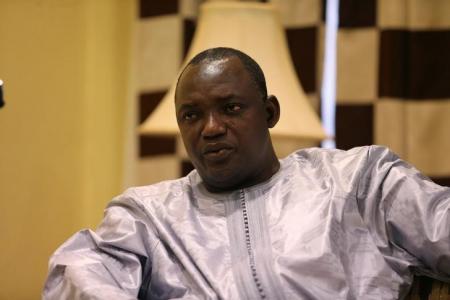
By Emma Farge
DAKAR (Reuters) – Gambia’s President-elect Adama Barrow has left the country for neighbouring Senegal, a coalition member and local media said on Sunday, a day after West African leaders failed to persuade President Yahya Jammeh to step aside.
Barrow, a former real estate agent, won a Dec. 1 election in the former British colony by a slim margin. Long-ruling Jammeh conceded defeat but then changed his mind, plunging one of West Africa’s tourist hot spots into crisis and dimming hopes for democracy in a region accustomed to coups and autocratic rule.
Barrow, backed by the West and the African Union, is due to be inaugurated on Jan. 19, although Jammeh is seeking to block this pending a Supreme Court ruling on his legal challenge to poll results.
“He (Barrow) is in Dakar. He will be back for the inauguration and we are mobilising the whole country for that,” said Isatou Toure, a member of Barrow’s coalition.
A spokesman for Senegal’s government was not immediately able to confirm his arrival which was also reported by state-owned news agency APS. Toure did not say why Barrow had gone to Dakar, although other supporters said he felt vulnerable given a lack of security.
The regional mediation mission to Banjul on Saturday, led by Nigeria’s President Buhari Muhammadu Buhari and Liberia’s President Ellen Johnson Sirleaf, was seen as the last attempt at a diplomatic resolution to the political impasse.
Talks with regional bloc ECOWAS in December had also failed.
The bloc will seek formal approval to send troops if Jammeh continues to refuse to step aside, U.N. Special Representative for West Africa and the Sahel Mohammed Ibn Chambas said earlier this week.
“His Excellency the President reiterated his position and that of The Gambia Government,” said a statement for Gambia’s President on the State House website after Saturday’s meeting.
Jammeh has cited irregularities in the polling process and is challenging the election results at Gambia’s Supreme Court.
But the court could not rule on his challenge this week because judges from Nigeria and Sierra Leone did not show up. The Supreme Court has indicated it may not be able to sit again until May.
(Additional reporting by Diadie Ba; Editing by Catherine Evans)